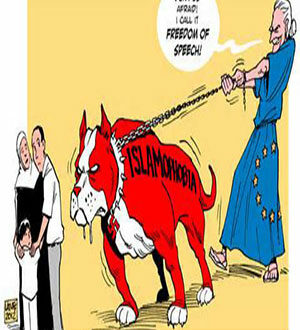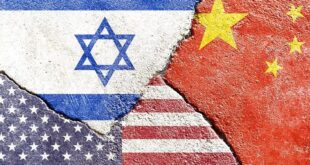To start with, it has to be repeated here, as it has in countless other such pieces, that Islam and Muslims condemn without apology and excuse any shedding of innocent blood, anywhere and everywhere in the world by whomever it may have been perpetrated. The same goes for Paris’s Charlie Hebdo and Hypercacher kosher supermarket killings.
In the aftermath, stories of the killing of a Muslim policeman who stood up to the Charlie Hebdo killers and a Muslim worker who saved scores of customers at the kosher supermarket have emerged. These, though, have been unable to stem the flow of expected Islamophobia.
With Charlie Hebdo’s printing of a front cover which once again targets Prophet Muhammad, it may be worth taking a look at the macro issue of Islamophobia, and how to appropriately and effectively respond to it.
Charlie Hebdo is and was certainly not unique in its disrespect of what and whom Muslims hold dear, and to see it in a vacuum without context would be to ignore the pattern of acceptable Islamophobia that has been engrained into the Western narrative of Islam and Muslims.
While the killing of innocents is both an un-Islamic and ineffective response to slow this Islamophobic tide, protests and condemnations have also been unproven as influential tools in Muslims’ arsenal.
The context of the attack, in the wake of continuing French support for militants in Syria, is that of the terrorist Frankenstein monster biting the hands of its own creators. Little in that is up for argument as for months, the Western, especially European governments have themselves warned of this very threat to their nations.
So where does Islam fit into the picture? Does the perpetrators’ claim to represent Islam authenticate that claim without reservation? If so, then can one presume automatically that Anders Behring Breivik was a Christian terrorist because he claimed he was motivated to preserve and safeguard Christianity and largely-Christian nations from multiculturalism and ‘Islamization’? Does the same go for former US President George W. Bush’s claim that ‘God told him to end the tyranny in Iraq,’ after which the ensuing war and occupation resulted in countless innocent deaths, torture and detention without charge, etc.?
The Muslim world’s response to terror attacks carried out in its name has been to ask for the very context summarized above. Muslims in the West, or in their own countries, are not asking for special treatment, but are only asking to be treated like other minorities.
One example worth noting is the treatment of Jews in the West, and the sensitivity to anti-Semitism there. Regardless of Muslims’ opinions of Israel and its ongoing atrocities against innocent Palestinians, there is a clear understanding on the part of many that this is less the fault of Jews and Judaism, than of a warped version of the monotheistic faith. Muslims then ask, ‘if we can make that clear distinction, why can’t the same be done for us?’ Few knowledgeable Muslims would want anti-Semitic cartoons or rhetoric to be supported, propagated and defended as part of ‘freedom of speech.’
That then is the crux of the matter. Freedom of speech must have some logical limits. Hateful incitement must not be tolerated; as anti-Semitism is rightly unacceptable, so too must Islamophobia be just as unacceptable. It is worth noting that in an increasingly right-leaning Europe, wherever there is anti-Semitism, there is Islamophobia, a fact often overlooked by both Muslims and Jews.
So back to the topic at hand: how should Muslims respond to Islamophobia? Clearly protests and condemnations have not been enough. There has to be a more strategic, united policy put in place by the Muslim world. As was seen after the Danish Islamophobic cartoon controversy, a boycott of sorts was put in place on certain Danish products by some Persian Gulf countries. That is one of many peaceful, but effective, measures that can be taken by a Muslim world with an immense spending power and resources at its fingertips, if done in a united, across-the-board manner.
In a globalized world, where Muslims too have come to rely on foreign products, many would argue that attempts at a boycott would be hard to implement. Certainly for hypocrites who have simply been paying lip service to defending Islamic sanctities, it would be hard. After all, how can they survive without their billion-dollar deals on buying French arms, luxury products, etc? It may, in fact, be a helpful exercise to implement a boycott just to separate the hypocrites from those who actually care. The same can be said about the pro-Palestine Boycott, Divestment, and Sanctions movement, which has yet to see a large following in a Muslim world obsessed with brands and images, more than the lives of innocent Palestinians suffering at the hands of the Israeli regime.
Certainly, a boycott is only one among a plethora of possible policies that can be implemented to force the West to finally end its hypocrisy regarding the freedom of speech and Islamophobia. Muslim unity, as a first step, would go a long way in ensuring the success of any such policy. It is time to stop our empty rhetoric and put our money where our mouths are in a world which only respects those who stand up for themselves.
WAQAR RIZVI
Analyst Waqar Rizvi is a political critic, with a background in divinity, philosophy, and engineering. He’s lived and studied in the UAE, Canada, and now Iran, and is originally from Pakistan, thus giving him a wide range of interests related to Islamic, North American, South Asian, and Middle Eastern Affairs. He has trained as a news presenter under Canadian broadcast journalist and voice coach, Cathy Sobocan. Before joining PressTV as a news anchor, a position which he currently holds, Waqar was an English teacher and radio host at the Call of Islam Radio station. He has also helped write, edit, and translate texts related to religion, as well as documentary and program scripts.
 Mouood Mouood English Edition
Mouood Mouood English Edition




